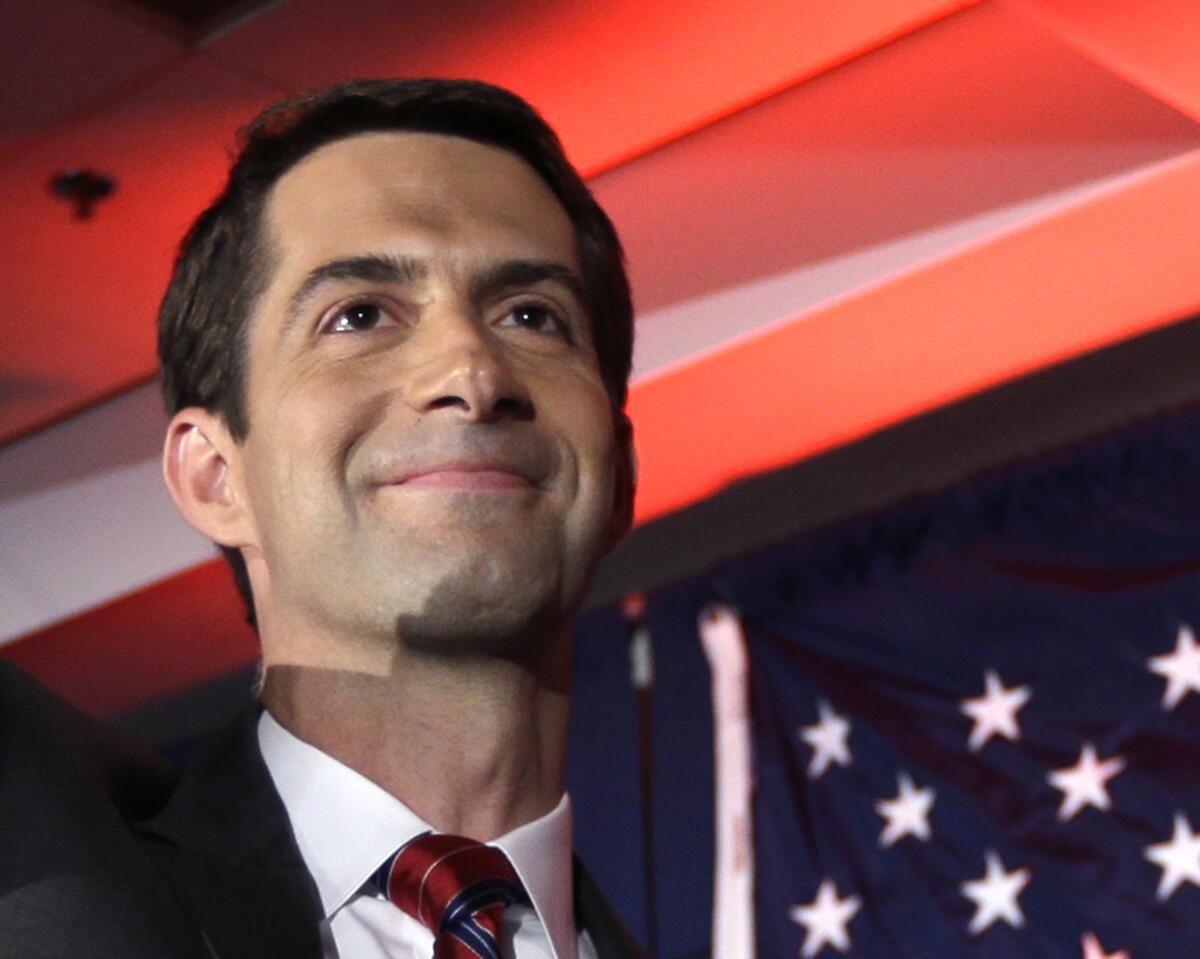GOP senators remind Iran in letter that any deal requires Congress’ OK

Some Republican senators on Monday escalated their campaign to thwart the White House’s effort to reach a nuclear agreement with Iran, releasing a letter to the Islamic Republic’s leaders indicating that any agreement must receive congressional approval.
A letter drafted by Sen. Tom Cotton of Arkansas and signed by him and 46 of his Republican colleagues also warned Iran that a new U.S. president could revoke a deal reached with President Obama.
The president’s years-long effort to reach a pact with Iran to limit its nuclear program has long faced bipartisan skepticism in Congress. Negotiations between Iran and six world powers, including the U.S., have proceeded in fits and starts; the next deadline is in June, with the Obama administration seeking a framework for a deal by the end of this month.
The Republicans’ one-page message, addressed as an “open letter to the leaders of the Islamic Republic of Iran,” reads as an effort to educate those who “may not fully understand our constitutional system.”
“We hope this letter enriches your knowledge of our constitutional system and promotes mutual understanding and clarity as nuclear negotiations progress,” the letter states.
But it directly contradicts the White House’s view that Obama is acting within his constitutional authority.
The White House noted that Cotton had previously promised to use pending legislation that seeks to require a congressional vote on any Iran agreement as a means to force an end to negotiations.
“When you have a letter that is signed by 47 senators of the same party being sent to the leader of another country, it raises, I think, some legitimate questions about the intent of those who signed the letter,” White House Press Secretary Josh Earnest told reporters.
Several Democrats harshly criticized the Republican letter and warned of the potential consequences. Sen. Dianne Feinstein (D-Calif.) said in a statement that the letter represented a “highly inappropriate and unprecedented incursion into the president’s prerogative to conduct foreign policy and is not befitting this chamber.”
In remarks on the Senate floor, Minority Leader Harry Reid (D-Nev.) said that with sensitive negotiations ongoing, it was “not a time to undermine our commander in chief purely out of spite.”
“Even at the height of our disagreements with President George W. Bush, Senate Democrats never considered sending a letter to Saddam Hussein,” he said.
Cotton, in an interview with CNN, brushed off criticism and criticized what he said was the administration’s apparent willingness to “pave the way for Iran to get a nuclear weapon.”
“The only thing unprecedented is an American president negotiating a nuclear deal with the world’s leading sponsor of state terrorism without submitting it to Congress,” he said.
Sen. John McCain (R-Ariz.), who also signed the letter, said the White House had “dramatically overreacted” to the letter.
Seven Senate Republicans withheld their signature, including Bob Corker of Tennessee, chairman of the Senate Foreign Relations Committee. He said he was focused on maintaining bipartisan support for legislation his committee will consider this week that could subject a final Iran deal to a vote in both the House and Senate.
“I still think that is the best approach,” he said.
Sen. Susan Collins of Maine, who also did not sign, said it was “more appropriate for members of the Senate to be giving our advice to the president, to Secretary [of State John F.] Kerry and to the negotiators.”
“What I would like to see us focus on is keeping the pressure on the president to make a good deal, not a bad agreement, and making sure that legislation is passed that requires the ultimate agreement to come before us,” she said.
The White House has fought any congressional attempts to meddle in the negotiations.
Speaking to reporters in the Oval Office, Obama said his focus was “seeing whether we can get a deal or not.”
“Once we do — if we do — then we’ll be able to make the case to the American people,” he said, “and I’m confident we’ll be able to implement it.”
For more White House coverage, follow @mikememoli
More to Read
Start your day right
Sign up for Essential California for news, features and recommendations from the L.A. Times and beyond in your inbox six days a week.
You may occasionally receive promotional content from the Los Angeles Times.







